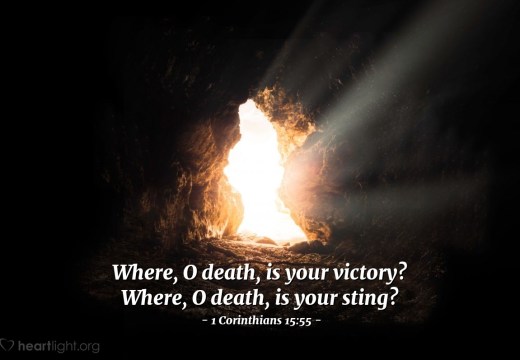Death where is thy sting? Saturday, 24th week in ordinary time – 1 Corinthians 15:35-37,42-49
A few members in the Corinthian community who believed that they had better spiritual gifts than others were now suggesting that the Resurrection of man was absurd. Paul is clear, if Christ did not rise, our proclamation has been in vain, our faith has been in vain, our testimony that God raised Christ from the dead is false and we still continue to live in our sin (1 Corinthians 15:13-17). For Paul, death does not have the last word; if it did then his courage and the courage of every Christian would be foolish bravado.
Paul holds no punches back. He asks the community “not to be deceived”; a term he has used twice before. He exhorts the people to keep good company for “bad company ruins good morals.” (verse33). Paul is clearly telling these Corinthians that their association with the Sadducees who did not believe in the resurrection or their association with the pagans, the Greek philosophical types, who did not believe in the resurrection (Acts 17:31-32) has led them to these false conclusions about the resurrection of the dead. He appeals once again to those spreading heresy, “come to a sober and right mind and sin no more; for some people have no knowledge of God.” He says this to shame them and the doubts that they were spreading.
Paul now turns from the fact of the resurrection, which for him is a given, to explain his point in a descriptive way. Paul’s argument in this important passage is that there is both a radical difference and a real continuity between the body that dies and the body that is raised by God’s power.

 Fr. Warner D'Souza is a Catholic priest of the Archdiocese of Bombay. He has served in the parishes of St Michael's (Mahim), St Paul's (Dadar East), Our Lady of Mount Carmel, (Bandra), a ten year stint as priest-in-charge at St Jude Church (Malad East) and at present is the Parish Priest at St Stephen's Church (Cumballa Hill). He is also the Director of the Archdiocesan Heritage Museum and is the co-ordinator of the Committee for the Promotion and Preservation of the Artistic and Historic Patrimony of the Church.
Fr. Warner D'Souza is a Catholic priest of the Archdiocese of Bombay. He has served in the parishes of St Michael's (Mahim), St Paul's (Dadar East), Our Lady of Mount Carmel, (Bandra), a ten year stint as priest-in-charge at St Jude Church (Malad East) and at present is the Parish Priest at St Stephen's Church (Cumballa Hill). He is also the Director of the Archdiocesan Heritage Museum and is the co-ordinator of the Committee for the Promotion and Preservation of the Artistic and Historic Patrimony of the Church.